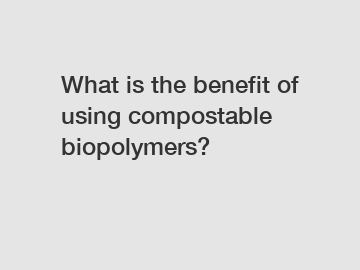What is the benefit of using compostable biopolymers?
Welcome to our blog, where we delve into the world of sustainability and innovation. Today, we'll discuss the remarkable benefits of using compostable biopolymers. Amidst growing concerns about plastic pollution and unsustainable packaging materials, these biopolymers offer a promising solution that combines environmental consciousness with practicality.
1. Reducing Plastic Pollution:
Plastic waste has become a global crisis, with detrimental consequences for our environment and wildlife. Compostable biopolymers offer a sustainable alternative to conventional plastics, as they are derived from renewable sources such as plants and vegetable oils. Their inherent ability to break down within a composting environment ensures that they do not linger in ecosystems or contribute to the alarming levels of plastic pollution plaguing our planet.

2. Minimizing Carbon Footprint:
Unlike conventional plastics that heavily rely on fossil fuel extraction and non-renewable resources, compostable biopolymers are made from organic materials. The production process emits significantly lower levels of greenhouse gases, making these materials an ideal choice for reducing carbon footprints and combatting climate change.
3. Closing the Loop with Circular Economy:
The concept of a circular economy revolves around reducing waste and maximizing resource efficiency. Compostable biopolymers perfectly align with this vision, as they can be composted alongside organic waste, thus returning nutrients to the soil. By facilitating the breakdown of these materials into valuable compost, they contribute to a closed-loop system where waste becomes a resource, minimizing dependence on landfills and incineration.
4. Boosting Agricultural Sustainability:
Beyond their environmental benefits, compostable biopolymers can significantly benefit agricultural practices. When applied as mulch films, these materials aid in conserving moisture, managing weeds, and protecting crops. Since they are eventually broken down into compost, they enrich the soil, reducing the need for synthetic fertilizers, which can be detrimental to both the environment and human health.
5. Health and Safety:
Unlike conventional plastics, compostable biopolymers do not contain toxic chemicals such as phthalates or Bisphenol A (BPA). With the increasing awareness about the potential health risks associated with plastic, especially in food packaging, these biopolymers present a safer alternative. They provide peace of mind for consumers, ensuring the absence of harmful substances in contact with our food and drinks.
6. Promoting Innovation and Research:
The development and use of compostable biopolymers have sparked a wave of innovation in the packaging industry. Manufacturers, researchers, and entrepreneurs are investing time and resources into finding novel ways to create biopolymers that meet the demands of diverse applications. This opens up vast opportunities for sustainable product packaging, leading to a shift in consumer behavior and overall market trends.
7. Encouraging Sustainable Choices:
One of the biggest advantages of compostable biopolymers is their role in raising environmental awareness and promoting more sustainable choices. As consumers become conscious of the impact their purchasing decisions have on the planet, they are increasingly demanding eco-friendly alternatives. By adopting compostable biopolymers for packaging, businesses can cater to this growing market, positioning themselves as environmentally responsible and socially conscious.
Conclusion:
Compostable biopolymers offer numerous benefits, making them a valuable tool in combating plastic pollution, fighting climate change, and promoting sustainable practices. Their ability to biodegrade into nutrient-rich compost, low carbon emissions during production, and absence of toxic substances, all contribute to a healthier environment and a more sustainable future. Let's embrace this innovative solution and work collectively to drive positive change in how we produce, use, and discard materials.
If you are looking for more details, kindly visit what is pbat, biodegradable starch resin, biodegradable resin.


